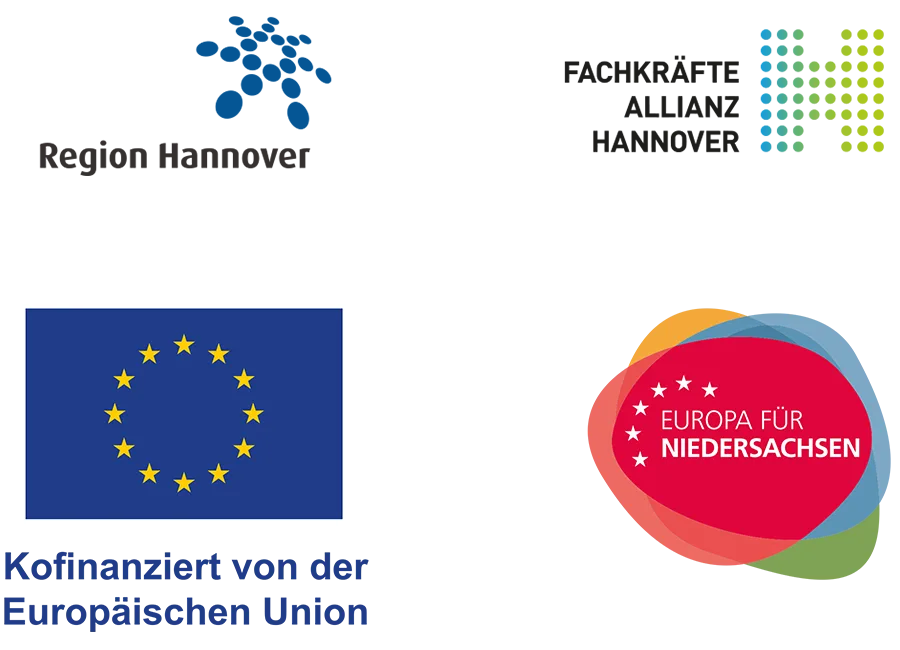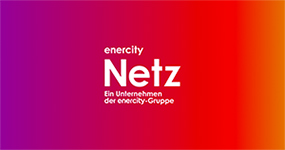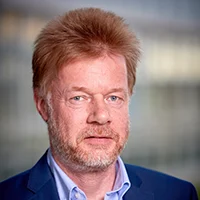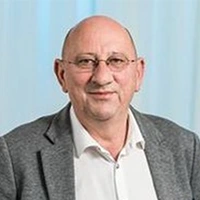
TROIA
TROIA – Tactile Robotics in the Work Environment
The project at a glance:
Project TROIA is intended to strategically advance the process of translating robotics and AI into Lower Saxony’s businesses and companies.

One of the Robokind Foundation’s special concerns is to accelerate the digital transformation process in Lower Saxony’s SMEs with the model project TROIA – Tactile Robotics in the Work Environment, by enabling trainees to become Roboscouts and developing new qualification formats in the field of robotics and AI for all skilled workers. Further information can be found in the press release and on our project page https://roboscouts.de/. Your contact person in the TROIA model project is project manager Mr Leif Griga.
Project duration: 01.07.2022-28.02.2025
The TROIA project is supported by EU, state and regional funds.


„Due to the rapid digitalisation of the energy networks and the resulting changes in processes and workflows, we must prepare and train our future specialists in good time. Robotics and AI will become as natural as the smartphone.”
CARSTEN CAMPE
Head of training at enercity Netz GmbH, Hanover, which is participating in the model project.

„The translation of robotics and AI into our processes, as envisaged in the TROIA model project, is a key objective of our company, so that we can achieve manufacturing entirely in the sense of Industry 4.0. Robokind is setting new standards with its approach of empowering apprentices to become Roboscouts and developing new qualification formats in the field of robotics and AI for all skilled workers.”
DR. MICHAEL MÜLLER
Managing Director of Dr. Dietrich Müller GmbH, Ahlhorn, which is participating in the TROIA project.
Advisory Board of project TROIA
The project is strategically accompanied by a top-class advisory board. The chairman of the advisory board of the TROIA pilot project is Dr. Oliver Brandt. All other members of the advisory board of the TROIA model project in alphabetical order:

Dr. Oliver Brandt
Hanover region
Team leader employment promotion
Dr Oliver Brandt, born in 1976, studied geography with a focus on economic geography at Leibniz Universität Hannover (LUH) and the University of Pretoria. As a research assistant at CAU Kiel, LUH and NIW, he devoted himself in particular to regional labour market research. At the end of 2008, he moved to Süderelbe AG, a PPP model for regional economic development, as project manager. Since 2017, he has been involved in employment-promoting projects of the Hannover Region Economic Development Agency – with a focus on social innovation and school-to-work transition. Since March 2019, he has been team leader for employment promotion at Region Hannover. The “TROIA model project” is a focus of Region Hannover’s robotics activities.

Uwe Brehl
Chamber of Crafts Hanover
Commissioner for Innovation and Technology (BIT) – Digitalisation
As a digitalisation consultant, Uwe Brehl assists craft enterprises with the diverse issues of digital transformation. The focus of his work in individual business consulting is on online personnel recruiting and software selection. In the event series “Digitalisation in the skilled crafts”, which he initiated, he shows new technologies and tools and thus provides digital answers to the shortage of skilled workers. He also supports various digitalisation transfer projects on topics such as exoskeletons, AI, cobots, etc. and shows practical application scenarios for the skilled trades.

Tilman Diepholz-Seeger
Ministry of Education and Cultural Affairs of Lower Saxony
Head of Unit; Unit 44: Industrial-technical vocational training, integration through vocational training
Tilman Diepholz-Seeger is Head of Department 44 at the Lower Saxony Ministry of Education and Cultural Affairs. Among other things, he is responsible for industrial-technical vocational training at vocational schools. He studied mechanical engineering and politics at the University of Hanover and has since been particularly committed to innovation in industrial-technical vocational education and training in various roles at vocational schools and state authorities. In his last position as headmaster of the Werner-von-Siemens School in Hildesheim, he implemented a robot centre (digitalisation master plan), among other things, and the development of new forms of learning and the implementation of structures and technologies are particularly close to his heart.

Heike Döpke
Employment Agency in Hanover
Chairwoman of the Management Board of the Hanover Employment Agency
Heike Döpke is Chairwoman of the Management Board of the Hannover Employment Agency. She is an expert on the training and labour market in the Hannover Region. With 1,600 employees, the Employment Agency advises and mediates employees and companies, on market issues and offers support. One of the main tasks is to support companies in training or recruiting skilled workers for their company. In addition, to enable young people to make the smoothest possible transition from school to work. Due to challenges facing society as a whole, such as digitalisation, structural change and demographic change, working life is changing for everyone: The demands on professions are changing, new professions are emerging or others are disappearing. Workers change jobs or occupations more frequently. This is why the Federal Employment Agency is increasingly focusing on individual career guidance for pupils, employees and job seekers:

Stefan Friedrich
Lower Saxony Ministry for Social Affairs, Labour, Health and Gender Equality
Department of Labour and Employment Promotion, Vocational Qualification

Stephan Grenz
Office for Regional Development Leine-Weser
Regional land development
Stephan Grenz, Dipl.-Verwaltungswirt (FH), was, among other things, business development manager in the district of Goslar for 11 years before moving to the Leine-Weser Regional Development Office in Hildesheim in 2015. There he is the contact person for projects in the fields of business and science. He also focuses on business-related projects for local authorities and other stakeholders. Since 2024, he has also been responsible for coordinating the Leine-Weser Regional Skilled Labour Alliance and is also represented on the TROIA advisory board in this role.

Torsten Hannig
DGB – Lower Saxony Central Region
Regional Managing Director
Torsten Hannig, born in 1961, studied German, Slavic and Political Science at the University of Marburg and Diploma in Education/Adult Education at the University of Bremen. Since the beginning of the 1990s, Torsten Hannig has worked at various professional and management levels of the German Trade Union Confederation in Bremen, Rhineland-Palatinate and Baden-Württemberg. After working for 3 years as a research assistant at the Johannes Kepler University in Linz, Austria, Torsten Hannig worked as a regional manager in the DGB region of Lower Saxony-Central at the German Trade Union Confederation in Hanover.

Hanna Sander-Böving
Hanover region
Employment Promotion – Department of Economic and Employment Promotion
“As project coordinator for digital work and education, it is particularly important to me that companies and their employees are not left alone in the digital transformation and are supported at an early stage. The Robokind Foundation has been making an important contribution to this for years in the Hanover region and throughout Lower Saxony with its educational campaigns. With the TROIA model project, the topics of robotics and AI are to be transported into the companies by the employees themselves and implemented together – a very promising approach, in my opinion”.
Hanna Sander-Böving has been project coordinator for the thematic field of “Digital Change in the World of Work” in the Economic and Employment Promotion Department of Region Hannover since August 2020. One focus of her work is the supervision of robotics education activities, which have been a central field of action for Region Hannover for years. Furthermore, she initiates and accompanies projects for the promotion of young STEM talent as well as for the promotion of digitalisation in vocational education and training.

Torsten Temmeyer
Hanover Chamber of Commerce and Industry
Securing skilled workers and promoting young talent
Torsten Temmeyer has been the IHK’s vocational training officer at the Hanover Chamber of Industry and Commerce since 2004. The focus of his activities is on securing skilled workers and promoting young talent in the area of international education, in particular the development and initiation of EU projects. Furthermore, Mr. Temmeyer is responsible for the area management of the IHK training marketing as well as the promotion of young talents in the MINT area; among other things with the introduction of an IHK certificate course in the area of “Robotics” (start in October 2017).
TROIA in the press and on the internet:
Amt für regionale Landesentwicklung Leine-Weser, an article published on 21.4.2023: https://www.arl-lw.niedersachsen.de/neues_aus_der_region/chancen-fur-die-region-leine-weser-durch-hannover-messe-221630.html
TROIA Info event in October 2023: https://niedersachsen.digital/roboscouts-infoveranstaltung/
TROIA Info event at Neuenhauser: https://www.emsvechtewelle.de/robokind-stiftung-macht-azubis-als-roboscouts-fit/
Die niedersächsische Gemeinde (2/2023), article on page 20: https://www.nsgb.de/wp-content/uploads/2023/04/DNG_0223.pdf
Wirtschaft kompakt (Heft 61), article on page 10: https://www.schaumburg.de/media/custom/3020_3504_1.PDF?1688644955
Handwerkskammer Hannover, an article published on 18.7.2023: https://www.hwk-hannover.de/artikel/roboscouts-robotik-fuer-unternehmen-23,0,6541.html
Norddeutsches Handwerk 8/2023: Norddeutsches Handwerk 8/2023 by Schluetersche – Issuu
DEHOGA magazine edition 4, September 2023: https://www.dehoga-niedersachsen.de/fileadmin/06_Presse_und_Media/07_DEHOGA-Magazin/DEHOGA_Magazin_4_2023_web.pdf
Neue Osnabrücker Zeitung, 12.5.2024: https://www.noz.de/lokales/haren/artikel/projekt-in-haren-roechling-azubis-programmieren-roboter-46964307